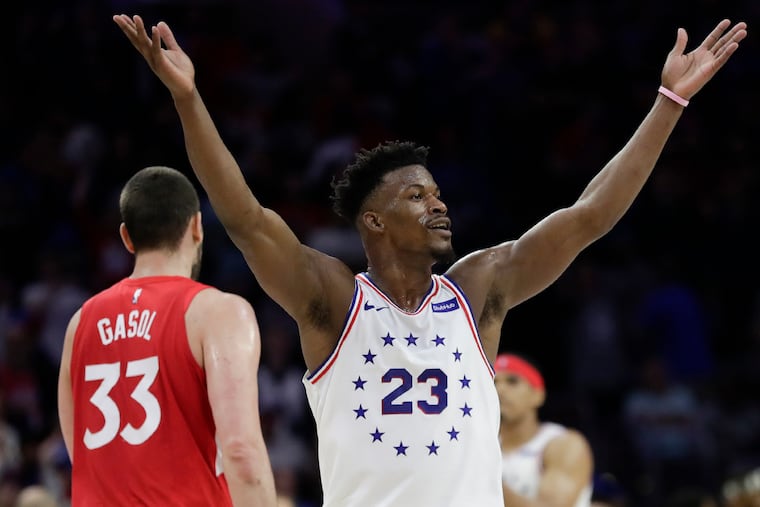Are the Sixers laying the groundwork to replace Jimmy Butler? | David Murphy
A look at a lingering question from NBA draft night.

The most intriguing moment of draft night happened before the Sixers were even on the clock.
At first glance, the front office’s decision Thursday to part with the No. 42 overall selection in order to shed themselves of the $1 million owed Jonathon Simmons was a blip that registered barely above procedural in terms of significance. The Sixers weren’t going to carry Simmons and his $5 million salary into the regular season after he failed to crack the rotation following his acquisition from the Magic in the Markelle Fultz trade. Rather than cut him and eat the $1 million of guaranteed money in his deal, they sacrificed the third of their four second-round picks to erase that number from their books. In return for Simmons and the pick, they received “cash considerations” from the Washington Wizards.
That might seem like a puzzling move when considered as a part of the whole of the Sixers’ draft night, during which they traded three of those second-rounders rather than adding another young prospect to develop. In isolation, though, it was a shrug of a transaction that easily could have been dismissed as the selling of a superfluous pick for a year’s worth of helicopter fuel. Maybe not the best optics for a hedge-fund manager worth billions, but common-sensical if the Sixers did not envision anybody at No. 42 sticking on the roster long enough to matter.
The more you thought it through, though, the more the plot seemed to thicken. Then, a little past midnight, Elton Brand added even more corn starch to the mix. When pressed by reporters in his postdraft press conference on the decision to trade so many of their picks, Brand pointed to the Simmons deal as a for-instance.
“It’s cap space,” Brand said. “Now we have an extra million dollars that we can use during free agency. I feel like I’m going to need every dollar.”
The curious thing about that thought process is how little that million bucks would actually mean if the Sixers end up re-signing Jimmy Butler, Tobias Harris and JJ Redick, which would put them over the cap and limit them to signing players to the veteran minimum and the roughly $5 million room exception. In that scenario, the biggest impact an extra $1 million could have is keeping them from eclipsing the luxury-tax apron, which would limit their ability to add talent in-season while also shrinking the size of their midlevel exception.
Granted, that’s not an insignificant thing. And maybe that’s all this was. But there’s another scenario in which that million bucks would mean a lot more, and have a more direct effect on the free-agent market that Brand referenced, and create a far greater sense of urgency for the Sixers to part with Simmons.
That’s the scenario in which Butler or Harris opts to sign elsewhere this offseason. If the Sixers feel that is a distinct possibility, then Brand’s explanation of his maneuvering makes perfect sense.
“The cap — we need flexibility,” the GM said. “I need every dollar that I can get. So that’s what a lot of those trades were about. Making sure we have enough money so we can go into free agency and get the players we need.”
With more than a week to go before the free-agent signing period, there is plenty of reason to suspect that the Sixers are preparing themselves for the likelihood that they will need to consider a Plan B. Let’s focus on Butler, who has been a prominent focus of the NBA’s rumor mill in recent days, with both the Lakers and Rockets supposedly interested in his services.
Some of that might be posturing, but would it really be a surprise if Butler decides he would rather not spend the next four or five years sharing the ball with a player such as Ben Simmons? Particularly with what we saw during the regular season, when Butler often seemed lost when Simmons was running the offense?
If Butler goes elsewhere, the Sixers would have in the neighborhood of $23 million in cap space to find a way to replace him. In that sort of situation, an extra million bucks could be the difference between signing a free agent such as Al Horford. It could be the difference in retaining Mike Scott, or landing a replacement.
Horford’s emergence as a potential Sixers target is another reason to wonder if there is something significant brewing under the surface. The only way it would make sense is if Butler leaves. In that situation, the hope would be that the addition of Horford at the four and helping to protect the rim would make up for the defensive drop-off that would come with having Harris guarding the perimeter rather than Butler. It would also eliminate the need for the Sixers to spend additional money on a backup center, something they would almost certainly have to do if they replace Butler with another wing.
Over a three- or four-year contract, an extra $1 million a year amounts to a considerable chunk of change, and could be the difference between Horford’s signing here or going elsewhere.
Maybe the Sixers are simply covering all their bases. Maybe the luxury-tax apron is really the primary concern. Maybe Josh Harris has a couple of really sweet vacations he has his eye on. Or, perhaps, all those things factored into the Jonathan Simmons move.
But it would also make a lot of sense if the Sixers think they are going to need to use cap space to bring in a significant player, or players, from the outside.